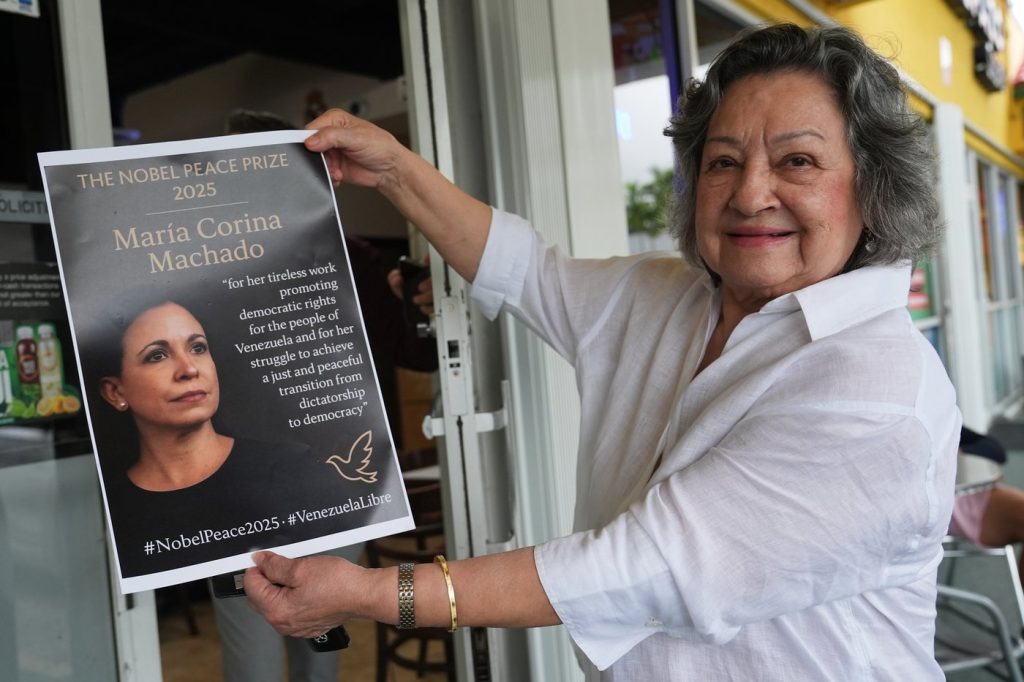DORAL, Fla. (AP) – In "Little Venezuela," the largest expatriate community of Venezuelans in the United States, the announcement of opposition leader Maria Corina Machado winning the Nobel Peace Prize has been met with mixed emotions. While the achievement is celebrated, it is overshadowed by the looming threats of deportation for many Venezuelans residing in the U.S.
The Trump administration has terminated Temporary Protected Status (TPS) and humanitarian parole programs that previously allowed over 700,000 Venezuelans to live and work legally in the country. Consequently, many individuals now face the risk of deportation. During this administration, multiple Venezuelans have been deported to El Salvador under claims of gang affiliations, arguing that their presence in the U.S. was an "invasion."
Despite the joyful recognition of Machado’s Nobel win, many within the Venezuelan community acknowledge that it will likely do little to alleviate their precarious circumstances in the United States. Machado has been aligned with President Donald Trump’s policies regarding Venezuela, which adds complexity to her supporters' hopes for change.
After Trump’s announcement in February to end TPS for Venezuelans, Machado indicated that her team had engaged with members of Congress to seek effective protective measures for law-abiding Venezuelans. However, following the Supreme Court's decision on October 3 to uphold the termination of the TPS program, Machado did not convey optimism about finding alternative protections for Venezuelan migrants.
Machado, who has relentlessly advocated for democratic transition in Venezuela, dedicated her Nobel Prize to "the suffering people of Venezuela" and expressed gratitude towards President Trump for his "decisive support" of their cause.
Frank Carreño, former president of the Venezuelan American Chamber of Commerce and a long-term resident of Doral, praised Machado's Nobel Prize recognition but cautioned that she is unlikely to pressure Trump for protections for Venezuelans in the U.S. Carreño noted that her political strategy heavily involves U.S. government support for restoring democracy in Venezuela rather than focusing on the needs of Venezuelans living abroad.
José Antonio Colina, a retired Venezuelan military officer who immigrated to South Florida in 2003, viewed Machado’s award as a recognition of her relentless fight for democracy and liberty in Venezuela. He expressed hope that the prize could bring momentum to efforts aimed at removing Nicolás Maduro from power.
However, not everyone in the community shared in the enthusiasm. Iris Wilthew, a Venezuelan American retiree who moved to Doral with her husband, expected celebratory gatherings at popular local establishments but was surprised by the lack of excitement. In a gesture of support, she placed a poster displaying Machado’s name, image, and the slogan "#VenezuelaLibre" in a restaurant window, emphasizing her view of Machado as a "tireless fighter" who achieved this honor through extraordinary efforts.
The emotional responses encapsulate a broader narrative of hope intertwined with anxiety, as Venezuelan Americans in areas such as Doral navigate their aspirations while facing the stark realities of changing immigration policies. The juxtaposition of Machado's recognition against the backdrop of political tensions and the threat of deportation paints a complex picture of the Venezuelan diaspora in the United States.











